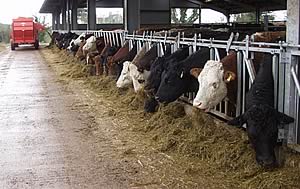 |
|||||||||
|
|||||||||||||||||||
|
|
Cull
cows will be wasted unless they are finished for export 03/01/06 Cull cow prices will hold up if as many farmers as possible make moves to reduce the leap in the number of animals coming forward after the OTMS ends on January 23rd and all post-August 1996 cattle must be sold commercially, the National Beef Association said today.
“The industry should aim collectively at boosting the availability of commercial OTM cows processed over the next three weeks and also try to minimise the volume handled immediately afterwards,” explained NBA chief executive, Robert Forster . “Stability will mainly depend on how dairy farmers, who over the last ten years have become used to putting end of lactation culls through the parlour and then loading them straight onto the wagon, react to this dramatic change.” “It is obvious that as many as possible should offer poor quality post-96 cows to the OTMS while it is still available. A number of OTMS abattoirs, especially in the South West of England and the Midlands , have short queues and there will be significant financial advantages for those who use them.” “But beef farmers can also help by first of all selling any animal they think will make more than 100p deadweight to commercial buyers in the run up to January 20 th when prices will be steadiest and then holding back immediately afterwards to help the post-OTMS market get established.” The NBA thinks cow owners should anticipate the re-opening of the export market too. This is not expected until mid-March at the earliest, but may not be much later, and it is clear that cow beef from the UK will be wanted in France , the Netherlands , Spain and also in the new accession countries. “Cows that can be sold for useful sums when export buyers are active should not be wasted by chucking them at a manufacturing beef market that is entirely dependent on the still emerging domestic trade,” said Mr Forster. “There will be almost immediate demand for UK cow beef on the short supplied EU market and carcases weighing more than 280kg classifying from P1 to R3 will be wanted which means lower classification cows sold soon after January 23 rd will almost certainly be undervalued.” “The obvious move is to finish as many suitable cows as possible and present them to export buyers. Not many dairy farmers will be able to do this but auction sales offer would-be cow feeders an opportunity to pick out the most likely animals and the more of these that are held back for 6-10 weeks feeding and are then sold for export the more stable the post-OTMS cow market is likely to be.” “In the meantime the bigger domestic manufacturing beef buyers will be moving onto the market and their suppliers will be looking for the type of carcase that has been making 110p-140p per dwkg .” “There is no reason why these prices should not continue for the best cows if the market conducts itself sensibly. At that price level more imported beef from the Republic of Ireland will be substituted and momentum for a market that is almost entirely supplied domestically can continue to build up too.” Mr Forster added.
| ||||||||||||||||||

|
|
||||||||||||||||||
| home | agri-services | pedigree
pen | news | dairy | beef | machinery quota | property | organisations | site map |
|||||||||||||||||||

